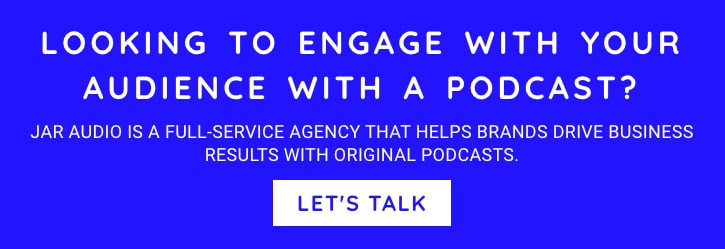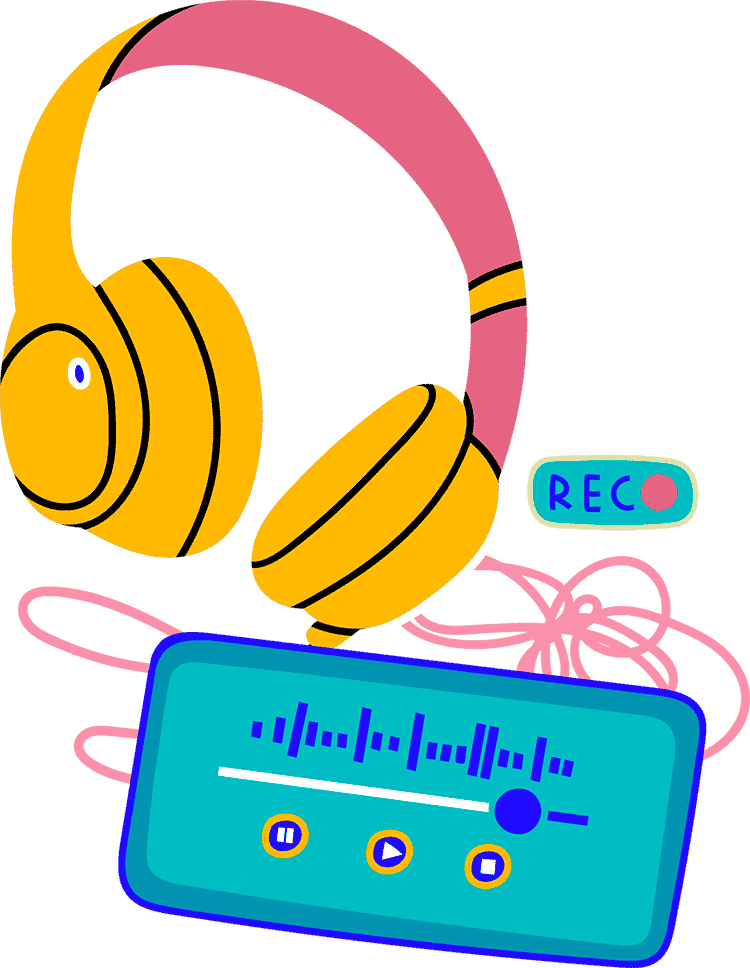How to Achieve and Track Measurable Results in B2B Podcasts
In the B2B world, we can’t stress enough the need for measurable results in B2B podcasts. The success of a podcast isn’t just about creating compelling content. It’s about achieving measurable results that align with your business goals.
Our Journey at JAR Audio
Eight years ago, Jen Moss and I founded JAR Audio because we’ve seen a significant gap in the market. Many brands were venturing into podcasting, but few were seeing tangible, measurable results. These podcasts were often failing to meet their business goals. We built JAR Audio to be a full-service podcast production and audience growth agency. We mix creative podcast content with strong marketing. This mix delivers real, measurable results for our clients.
Results are important to me. I spent 22 years in advertising. I worked with top agencies like DDB and Cossette and with clients such as Four Seasons, Lamborghini, and BC Lotteries. I’ve seen a lot of content produced. Unfortunately, much of it lacked measurable results. This experience has reinforced my belief. Podcasts are the best format for reaching and tracking business goals.
Case Studies: Real-World Impact
Our approach at JAR Audio has delivered outstanding results for a variety of clients:
-
Staffbase: By creating a podcast series tailored to communications professionals, we helped Staffbase increase brand love from this important audience. The measurable impact included increased engagement metrics.
-
Amazon: Our partnership with Amazon involved producing a podcast that not only entertained but also educated small business owners. The podcast achieved high download numbers and impressive listener retention rates, directly contributing to their marketing goals.
-
Genome BC: For Genome BC, we crafted a podcast that simplified complex scientific topics for a broader audience. This initiative resulted in significant audience growth and increased public awareness of genomics, demonstrating the power of podcasts in achieving outreach goals.
Understanding Measurable Results in B2B Podcasting
Measurable results in B2B podcasting are quantifiable outcomes. They come from your podcast’s performance and audience engagement. These can include download numbers. They can also include listener retention and episode completion rates. These figures help gauge your podcast’s effectiveness. They ensure it aligns with your broader business goals.
Specific Challenges in Measuring Podcast Success
Measuring podcast success has a challenge. It’s the difference between downloads and actual listens. Downloads don’t always mean the content was consumed. Many listeners may download episodes without playing them. Also, tracking listener engagement accurately is hard. Not all platforms provide detailed analytics on how long an episode was listened to or at what point listeners drop off. This makes it harder to assess which parts of the content are most engaging. This is where a podcast agency becomes valuable. They have tools and experience to gather the data. They will make recommendations about what the data means.
Integrating Podcast Performance Data with Other Marketing Metrics
To see your podcast’s full impact, you must mix podcast data with other marketing metrics. This can involve linking podcast analytics with your website’s traffic data. It also involves your social media engagement and lead generation metrics. Tools like Google Analytics can help track visitors from podcast links. There are also specific conversion tools that JAR Audio uses. They show how podcasts boost traffic and sales on your website. By comparing podcast engagement to broader marketing efforts, you can better see the role your podcast plays in your strategy.

Innovative Strategies to Achieve and Track Progress in Podcasting
-
A/B Testing means experimenting with different podcast elements. These include episode titles, formats, and call-to-actions. The goal is to see which versions perform better. This can help optimize content for better engagement and conversion rates.
-
Survey your listeners often. Use the surveys to learn what they enjoy and what they suggest for improvement. This direct input can guide content development and enhance listener satisfaction.
-
Cross-promotion is key. Integrate your podcast with other marketing channels. These include email newsletters, social media, and blogs. Podcasting broadens your audience reach and provides many touchpoints. It lets you track how content influences behavior across different platforms.
-
Use Advanced Analytics Tools. They give deeper insights into listener behavior. For example, when they skip or re-listen to parts of an episode. This data can refine content strategies. It will help them better meet listener preferences and achieve business goals.
Measurable results are vital in B2B podcasting. They provide insights that help refine content strategy and achieve business goals. It’s time for B2B marketers to embrace data-driven decision making. Start implementing measurement strategies in your podcasting efforts today. Remember, patience and a long-term perspective are key. Success in podcasting is a marathon, not a sprint. Finally, never lose sight of the importance of content quality and relevance. These are the heart of achieving measurable results.
5 Key Takeaways on Measurable Results in B2B Podcasts:
- Importance of Measurable Results: Understanding and tracking measurable results is crucial for aligning your podcast with broader business goals, ensuring it not only entertains but also contributes to your objectives.
- Challenges in Measurement: Accurately measuring podcast success can be challenging due to the difference between downloads and actual listens, and the lack of detailed analytics from some platforms.
- Integration with Other Metrics: Combining podcast performance data with other marketing metrics, like website traffic and social media engagement, provides a comprehensive view of your podcast’s impact.
- Innovative Strategies: Utilizing A/B testing, audience surveys, cross-promotion, and advanced analytics tools can significantly enhance your podcast’s performance and engagement.
- Case Studies: JAR Audio’s successful collaborations with clients like Staffbase, Amazon, and Genome BC demonstrate the power of well-executed podcasts in achieving business and outreach goals.
Roger transitioned from a 22 year career in advertising account management to co-founding JAR, a podcast podcast production agency. As CEO of JAR, he propels the company’s growth by prioritizing audience engagement and podcast marketing. Under his guidance, JAR flourishes with a global clientele, aiming to broaden its reach across North America and revolutionize brand connections through immersive storytelling.





